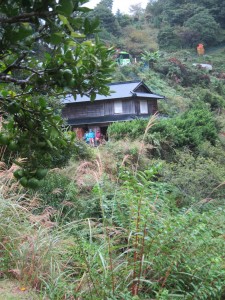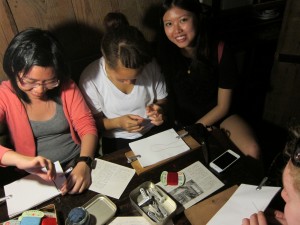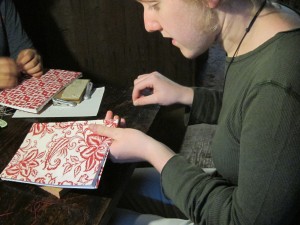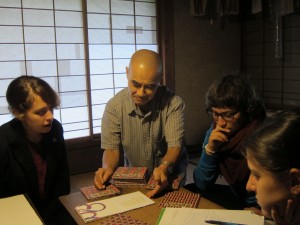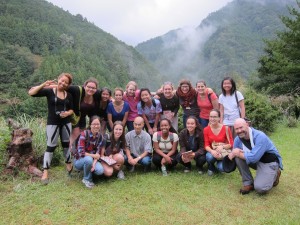[Wednesday in Kamikatsu]
The weather is off and on rain today, as a typhoon blows itself out south of us. There isn’t much wind and the rain is more of a nuisance, increasing the humidity, rather than a difficulty. We drove back up to Nakamura’s this morning, the bundles of rice left to dry in the paddies looking forlorn in the damp, the persimmons virtually aglow on the trees. Our covers need to be cut and sewn onto our carefully folded signatures (the folded sheafs of paper that make up the pages of the book). The templates are cut for either a Japanese style book (opening left to right) or Western styles – we need to decide before we select the front cover.
The rhythm of measuring, marking, cutting and folding requires a focussed attention to detail, the making of art for many artists is a mindful, if not fully meditative, activity. I find that the mix of physicality and math (geometry) gathers up the strands of my attention and holds them loosely enough to not feel constrained, but tightly enough to keep my attention from wandering.
The act of making an everyday object, something that I have so many of in particular, makes me aware of how much I depend on the work of others to sustain my life. Would I still stack books on the floor with abandon if I had bound each by hand? if I knew they’d been bound by hand?
The students had time this damp afternoon to talk to Nakamura about his life, how does he sustain himself, why did he choose this quiet and simple life. Nakamura told them he finds joy in the creating, it is the process he cherishes, more so than the product. Hence, while he freely shares his art, he doesn’t sell it. Before he retired, he worked a few months a year to pay for his necessities, now, at 67, he is receives the Japanese equivalent of social security. He points out that while he lives alone, he is bound into his community in many ways (health care and social security, the radio broadcasts that alert him to bad weather, the bus he takes to Tokushima, the care of his neighbors).
They wondered if he had regrets about his choices and he said that there are always regrets in life, but he would rather regret the things he had done, then the things he hadn’t done. (Which Prof. Schulz pointed out is in line with psychological research on regret!) Students wondered how much contact he had with other people and he told them about his occasional (once or twice a year) trips to the small port city down the river, his letters to and from family, a weekly walk to the onsen (the hot spring baths about a 40 minute walk down the hill).
We finished off the day with a wonderful hot pot dinner, vegetables, noodles, and thin slices of meat to cook in soy milk. A challenge to some of our skills with chopsticks (I will admit to having lost control of a pile of noodles between the pot and my dish), but fun and delicious to eat.

